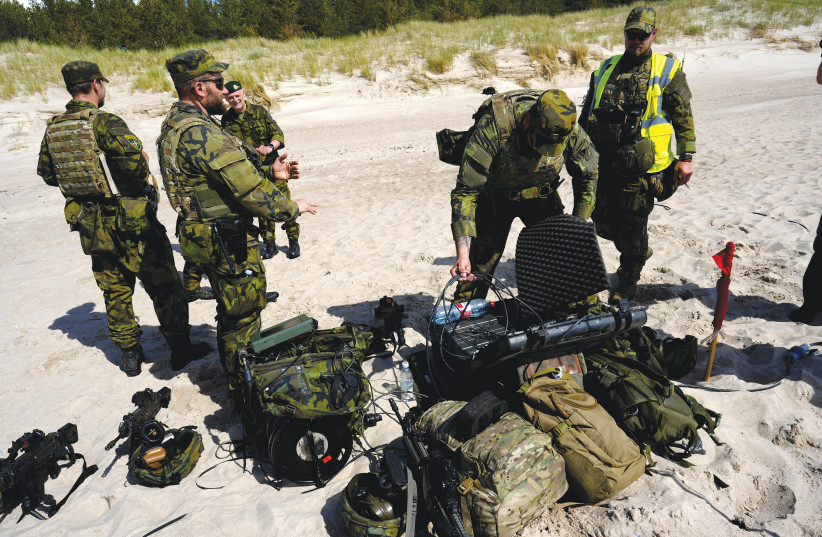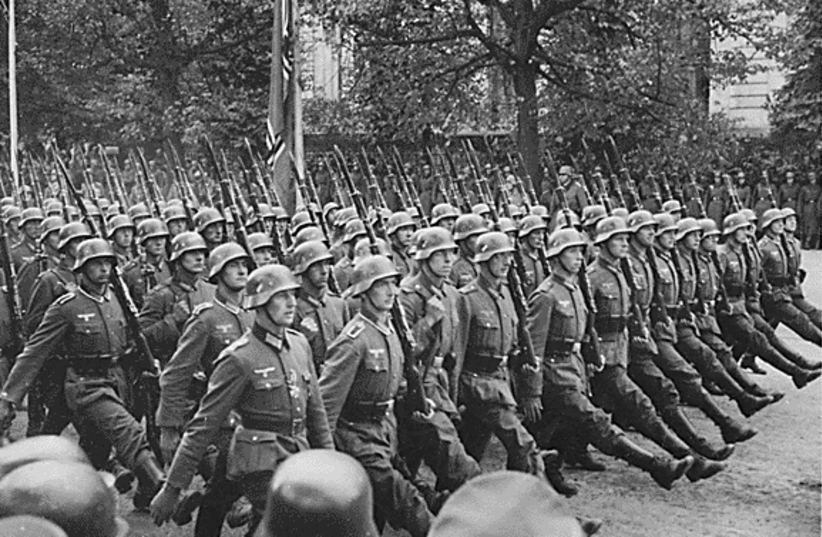ALEXEI BAYER

In summary, Western leaders are determined to avoid fighting Russia, but they are not avoiding a direct confrontation, only postponing. When NATO finally has to fight Russia, it will have to do so under far less favorable conditions. While thinking that they are preventing nuclear war, our leaders are actually making it more likely.
If history rhymes, as Mark Twain is often reputed to have said, then we are living an exact rhyme with September 1939. As exact as the often cited literary example from Macbeth, “Double, double toil and trouble/Fire burn and caldron bubble.” The global cauldron is once more bubbling, as it did when Hitler invaded Poland, and democracies once more are standing on the sidelines hoping that it will somehow be taken off the boil.
President Vladimir Putin’s invasion of Ukraine was preceded by several local conflicts that rhymes with Hitler limbering up for his invasion of Poland. Putin’s war against Georgia, intervention in Syria and annexation of Crimea rhymes with Hitler’s intervention in the Spanish civil war, Anschluss (joining or connection, ref. the annexation of the Federal State of Austria into the German Reich on 13 March 1938) with Austria and dismantling of Czechoslovakia.
The war against Ukraine opened a new page and took Russia’s military adventurism to the next level – just as Hitler’s attack on Poland had done. Now, the collective West understands that, and Britain and France did back in 1939.
 German soldiers are seen marching in Warsaw following the Nazi invasion of Poland in 1939. (credit: FLICKR) Back in 1939
German soldiers are seen marching in Warsaw following the Nazi invasion of Poland in 1939. (credit: FLICKR) Back in 1939London and Paris were committed to defend Poland’s territorial integrity and they declared war on Germany, in 1939. Today, NATO members and other democratic nations have lent Ukraine diplomatic, economic and military support but have not declare war on Russia because, as US President Joe Biden, NATO chief Jens Stoltenberg and other leaders have repeatedly stated, they have no obligation to defend Ukraine and it is important not to confront Russia, a nuclear power.
But after declaring war in 1939, Britain and France did little to help Poland. They dug in on the Western front, in what became known as the Phony War. Not only did they not fight, but they managed to lose Norway to Hitler, in April 1940. Whatever they were waiting for, it bears repeating that in May 1940, the British and French were nevertheless forced to fight. Paris fell and the British Expeditionary Force narrowly avoided annihilation – a result that could not have been worse if they had attacked Germany in the fall of 1939, while its troops were busy annihilating Poland.
It is actually worse. Conventional wisdom maintains that if Britain and France had come to the defense of Czechoslovakia in 1938, rather than trying to appease Hitler, the same scenario would have played out one year earlier. This is wrong. Czechoslovakia was defensible. It had a potent industrial base and it was a leading arms exporter. It had a small but technologically advanced military and its territory was protected by mountain ranges, rather than being flat, like Poland.
Nor was Germany’s Wehrmacht as powerful in 1938 as it became a year later – in part thanks to Czechoslovak weapons, industry and nearly 3 million Sudeten Germans.
MOREOVER, THE betrayal of Czechoslovakia was a factor prompting Stalin to conclude the Molotov-Ribbentrop Pact and emboldening him to invade parts of Eastern and Northern Europe.
Standing up to Hitler in 1938 probably would not have prevented World War II, but it would have prevented Hitler’s sweep of Europe in 1939-40. The war would have been less prolonged and less bloody – certainly with fewer victims among Jews, Poles and other civilians.
It is easy to focus on the failures of the Russian military and to miss the big picture. The endless talk about Lend-Lease and various other arms shipments to Ukraine also serves to obfuscate reality. The fundamental point is that Russia has both the resources and the determination to continue to fight Ukraine and to destroy its infrastructure. This will go on, even if Ukrainians liberate all occupied territories.
As Arsen Avakov, former-Internal Affairs Minister of Ukraine, recently admitted, by winter much of Ukraine will not have electricity, gas and heat. Losses among the Ukrainian military and civilian population will continue to mount. Refugees, who have recently been returning home more, will stream back out.
Meanwhile in Western Europe, refugee fatigue and annoyance with the war is setting in. Moreover, the global economic situation is deteriorating and the war’s impact on food supply and energy markets is becoming a major problem. Political leaders will soon have their hands full and will simply wish Ukraine to go away.
But Ukraine – or rather Russia – is not going away. The war has marked a change in Russia. Support for Putin has increased and the siege mentality has taken hold. Russians now believe that they are fighting all of NATO. Now, the Russian Federation, much like Nazi Germany in 1939, stands behind Putin.
Ukrainian leaders have been saying that they are fighting not just for their own national survival but for democracy. If Ukraine falls, Putin will get its resources and will control a large portion of the global grain market. Moreover, control over Ukraine’ territory will thrust Russia into the heart of Europe once more. Putin will move next to the Pridnestrovian Moldavian Republic (PMR) and then to the Republic of Moldova, and after that will start a Donbas-style of subversion in the Baltic.
This is what Russian propagandists have been repeating over the past three months and they should be heeded – just as it would have been useful for people in the early 1930s to have paid more attention to Hitler’s Mein Kampf.
Time will come when NATO will have to fight Russia. Today, it still has a chance to do so under favorable conditions – the way Britain and France could have done when Hitler threatened Czechoslovakia. The alternative for NATO, just like for Britain and France back then, is to wait and hope that Putin will be satisfied with Ukraine and then to fight a longer, bloodier war against a stronger, emboldened Russia, which like Hitler after his early successes will have more allies and more resources. Ironically, trying to avoid a nuclear confrontation now will greatly increase the likelihood of one later.
No comments:
Post a Comment